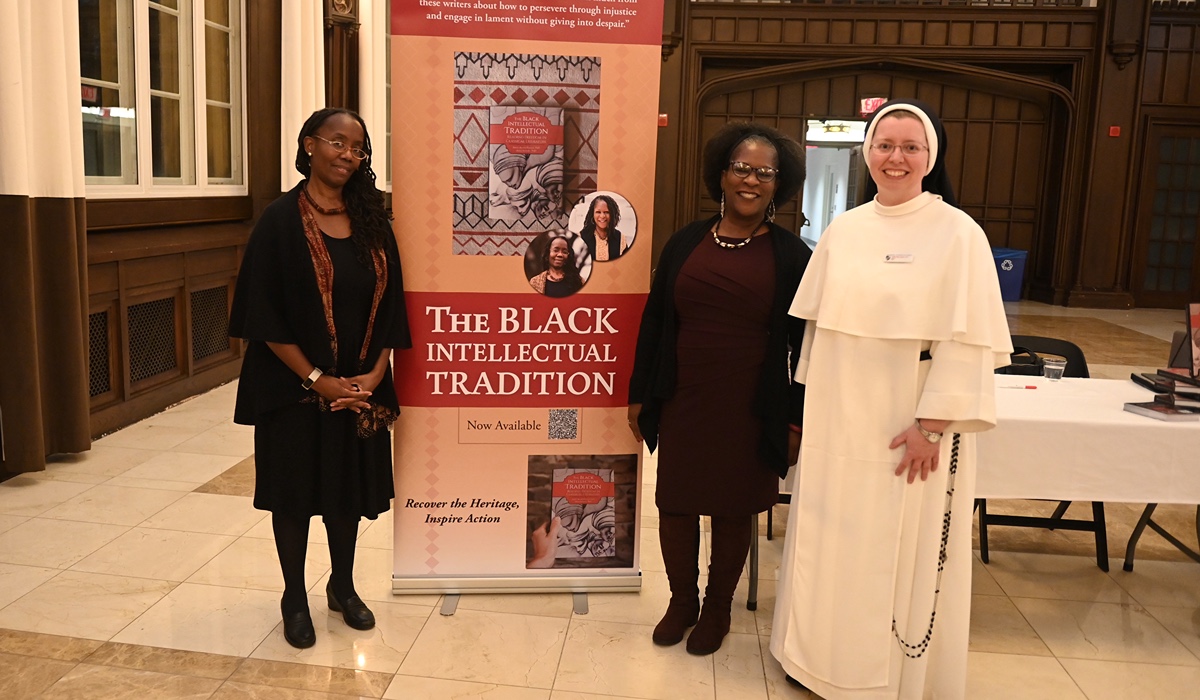

The Institute for the Transformation of Catholic Education (ITCE) at Catholic University co-sponsored a discussion and book signing with Classical Academic Press on Nov. 8 about efforts to reclaim the value of the Western canon for all students in light of the book "The Black Intellectual Tradition: Reading Freedom in Classical Literature."
ITCE board member Anika Prather, Ph.D., said she co-authored the book with Angel Parham, Ph.D., as part of their mission to “decolonize classics” by demonstrating the core role the canon played in the lives and works of Black American icons such as Martin Luther King, Jr., Phillis Wheatley, Frederick Douglass, Anna Julia Cooper and Toni Morrison.
Prather said during her presentation with Parham at the event held at Heritage Hall that she hopes "The Black Intellectual Tradition" will highlight their work as classical educators to “create a generation of young people who know how to engage in civil discourse” and how to talk through difficult topics in “a safe and healthy space, and allowing the ancients to help us do that.” Prather emphasized their educational model is “not Afrocentric. It’s Christ-centric,” explaining that reading the original texts allows students to see the diversity of a shared Western inheritance.
“What I seek to do is bring this universal treasure chest to every child. Because it works for every child…It doesn’t matter the color of your skin or your background,” said Prather, noting the important role the Catholic Church has historically played in increasing access to a liberal arts informed education by establishing schools in disenfranchised communities.
“This is why I support the Institute. I have seen lives change,” said Prather, noting the success she has had teaching students from even the most difficult backgrounds at the K-12 school she founded in 2015.
The Institute for the Transformation of Catholic Education, established in 2021, aims to inspire and promote the spiritual, intellectual, cultural and operational renewal of our nation’s Catholic schools through teacher and leader degree and professional development programs, school accreditation and research. ITCE director Sister Mary Agnes Greiffendorf, O.P., Ph.D., associate professor of education, said she invited Prather to be on the ITCE board of advisors because of her “incredible advocacy for a classical Christian education…She brings invaluable perspective as a committed follower of Christ, lifelong educator, and woman of color.”
“Their research brings to light our common heritage - Black and White - in the classics and the liberal arts,” said Sister Mary Agnes. “They share powerful testimonies from the past and present on how great works of the Canon can provide a path to unity and healing.”
Parham, who provides curriculum and programming tailored to students from diverse backgrounds. She said classical studies are important because they allow children “to see the world through someone else’s eyes who truly does not see race because there is no such thing as race in the ancient world.”
“It’s important not just for children of color but for all children to see that that’s not how it’s always been and that’s not the natural order of things,” said Parham, noting how cosmopolitan the ancient world was and that the West was profoundly shaped by the work of North African theologians. “This is not just for Black children. All children need to know that the world is not just their story.”
Prather said that re-examining the Western canon does not require “overlooking the past, but looking at it a little differently.” She said through their research they found a common thread among abolitionists and civil rights leaders was a shared literacy in the Western canon that inspired and shaped their vision for shaping a more perfect union.
“A common type of education is what bound us together to try to think through the mistakes of humanity’s past…this story of human and American history draws people into seeing that this is our country. We are part of this story,” said Prather.